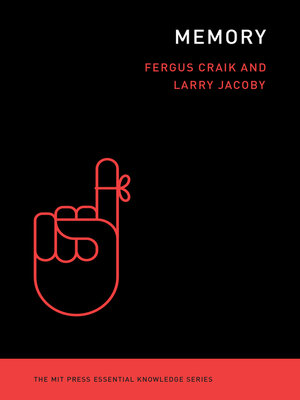
Sign up to save your library
With an OverDrive account, you can save your favorite libraries for at-a-glance information about availability. Find out more about OverDrive accounts.
Find this title in Libby, the library reading app by OverDrive.



Search for a digital library with this title
Title found at these libraries:
| Library Name | Distance |
|---|---|
| Loading... |
A short, accessible primer on human memory, its workings, feats, and flaws, by two leading psychological researchers.
Why do we vividly recall a traumatic childhood event but forget where we left our keys five minutes ago? How can a scent take us back fifty years while a colleague’s name eludes us? In this compact introduction, two leading psychological researchers describe memory—how it works and why it sometimes doesn’t; how it can be tricked, trained, or improved; and what changes with time.
In a manner as engaging as it is informative, Fergus Craik and Larry Jacoby explain the strengths and weaknesses of memory. They trace evolving ideas about memory’s function and present a down-to-earth account of modern views. Citing the latest research, they outline the processes for acquiring and retrieving memories and explore the distinction between conscious and unconscious processes. With insights into the workings of the brain, Craik and Jacoby also provide a succinct account of feats and failures of memory, emotion and false memories, and the effects of aging. Their book draws a clear picture, at once broad and concise, of current and classical views of memory, that most essential and often mysterious feature of human life.
Why do we vividly recall a traumatic childhood event but forget where we left our keys five minutes ago? How can a scent take us back fifty years while a colleague’s name eludes us? In this compact introduction, two leading psychological researchers describe memory—how it works and why it sometimes doesn’t; how it can be tricked, trained, or improved; and what changes with time.
In a manner as engaging as it is informative, Fergus Craik and Larry Jacoby explain the strengths and weaknesses of memory. They trace evolving ideas about memory’s function and present a down-to-earth account of modern views. Citing the latest research, they outline the processes for acquiring and retrieving memories and explore the distinction between conscious and unconscious processes. With insights into the workings of the brain, Craik and Jacoby also provide a succinct account of feats and failures of memory, emotion and false memories, and the effects of aging. Their book draws a clear picture, at once broad and concise, of current and classical views of memory, that most essential and often mysterious feature of human life.







